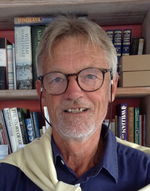
Welcome!
Welcome to my web site. I am an economic and monetary historian based in Folkestone, England. Though trying to retire, I can still be found in different parts of the world, lecturing, consulting and giving workshops. Combining formal training with a wide range of experience that embraces both accounting and artistic elements (see Gallery), my work has two goals: to contribute to the metamorphosis of capitalism and to overcome the reputation of economics as a dismal science!
PROJECT AREAS
Deep Accounting / Prospects for a World Currency / Youth Financial Literacy / The Role of the Corporation and the Future of Not-for-profits / Financing Education / The Economics of Farming
Through these six main project areas, my work explores the subtler aspects of economic and monetary history in order to sense the deeper meaning of current circumstances and where they might be leading.
ASSOCIATIVE ECONOMICS
In all I do, my colours are firmly nailed to the mast of associative economics, an approach to economics that combines financial discipline with active social responsibility on the part of human beings, see ae-Mark.com, of which I am a co-creator. Originating in Rudolf Steiner's contribution to economics, this is a non-partisan approach to the wide and divergent range of thought currently informing modern debates – from neo-liberal to ‘alternative’.
YOUTH BONDS
All my life, I have been concerned with how to finance young people. This has culminated in my focus on youth bonds and youth financial literacy. (See also financefolkestone.com.)
KEYNES'S UNSPOKEN MISSION
I continue to explore my hunch that John Maynard Keynes had a sense that post World War 1 the step should not have been been a transfer of hegemony from Britain to the United States, but the creation of a global economic commonwealth or partnership of all countries. Though against the grain of current political realities, this idea makes sense of many of the deeper aspects of Keynes's work, as also of today's underlying events.
RARE ALBION
An important (and fun) part of my work is thinking allegorically – imagining what might be, as a means of understanding what is... or seems to be. I do this by commenting on economic affairs viewed from the perspective of an imagined land, Rare Albion, where economic and monetary life is conducted as if the world were a single global affair with one currency (based on accounting, but with many denominations) and where economic governance is autonomous yet mindful of political considerations. The 2005 book, Rare Albion – the Further Adventures of the Wizard from Oz, provides an introduction. Written in the Spring/Summer of 2020, Rare Albion, Too – the Story of Folkstown is a sequel that elaborates on life in Rare Albion, at the same time as examining and playing with my thesis concerning Keynes – imagining how things might be had his ideas prevailed...
AND NOW A DISRUPTIVE ARTIST...
Albeit in amateur mode, I have long used visual media with my work, especially coloured chalks on black paper. But also creating exhibitions of various kinds. My latest effort is an installation in the centre of Folkestone, England, where I live, which is trying to bring into being a pedestrianised area where currently traffic dominates. What has this to do with economics? In my view, economics is characterised by the crucial fact that it begins with an imgained world that is gradually brought into reality via ideas, then tropes, then policies. For the most part, this process is an intellectiual one, meaning the starting ideas and the resulting social consequences are to one side of reality. But the same process can be used to imagine, rather than theorise, how the world might look. In the end, politicians and markets follow genuine imaginations and this installation aims to be an example of that. Time will tell, but here's a glimpse.
